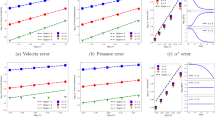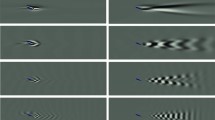Abstract
We propose two unconditionally stable, linear ensemble algorithms with pre-computable shared coefficient matrices across different realizations for the magnetohydrodynamics equations. The viscous terms are treated by a standard perturbative discretization. The nonlinear terms are discretized fully explicitly within the framework of the generalized positive auxiliary variable approach (GPAV). Artificial viscosity stabilization that modifies the kinetic energy is introduced to improve accuracy of the GPAV ensemble methods. Numerical results are presented to demonstrate the accuracy and robustness of the ensemble algorithms.
















Similar content being viewed by others
Data Availability
Enquiries about data availability should be directed to the authors.
References
Mohebujjaman, M., Rebholz, L.G.: An efficient algorithm for computation of MHD flow ensembles. Comput. Methods Appl. Math. 17(1), 121–137 (2017). https://doi.org/10.1515/cmam-2016-0033
Wei, D., Zhang, Z.: Global well-posedness of the MHD equations in a homogeneous magnetic field. Anal. PDE 10(6), 1361–1406 (2017). https://doi.org/10.2140/apde.2017.10.1361
Trenchea, C.: Unconditional stability of a partitioned IMEX method for magnetohydrodynamic flows. Appl. Math. Lett. 27, 97–100 (2014). https://doi.org/10.1016/j.aml.2013.06.017
Mohebujjaman, M., Wang, H., Rebholz, L.G., Mahbub, M.A.A.: An efficient algorithm for simulating ensembles of parameterized MHD flow problems (2021). arXiv:2108.05110
Jiang, N., Layton, W.: An algorithm for fast calculation of flow ensembles. Int. J. Uncertain. Quantif. 4(4), 273–301 (2014). https://doi.org/10.1615/Int.J.UncertaintyQuantification.2014007691
Jiang, N., Layton, W.: Numerical analysis of two ensemble eddy viscosity numerical regularizations of fluid motion. Numer. Methods Partial Differ. Equ. 31(3), 630–651 (2015). https://doi.org/10.1002/num.21908
Jiang, N.: A higher order ensemble simulation algorithm for fluid flows. J. Sci. Comput. 64(1), 264–288 (2015). https://doi.org/10.1007/s10915-014-9932-z
Jiang, N.: A second-order ensemble method based on a blended backward differentiation formula timestepping scheme for time-dependent Navier–Stokes equations. Numer. Methods Partial Differ. Equ. 33(1), 34–61 (2017). https://doi.org/10.1002/num.22070
Gunzburger, M., Jiang, N., Schneier, M.: An ensemble-proper orthogonal decomposition method for the nonstationary Navier–Stokes equations. SIAM J. Numer. Anal. 55(1), 286–304 (2017). https://doi.org/10.1137/16M1056444
Fiordilino, J.A.: A second order ensemble time stepping algorithm for natural convection. SIAM J. Numer. Anal. 56(2), 816–837 (2018). https://doi.org/10.1137/17M1135104
Jiang, N.: A pressure-correction ensemble scheme for computing evolutionary Boussinesq equations. J. Sci. Comput. 80(1), 315–350 (2019). https://doi.org/10.1007/s10915-019-00939-w
Gunzburger, M., Jiang, N., Wang, Z.: An efficient algorithm for simulating ensembles of parameterized flow problems. IMA J. Numer. Anal. 39(3), 1180–1205 (2019). https://doi.org/10.1093/imanum/dry029
Jiang, N., Qiu, C.: An efficient ensemble algorithm for numerical approximation of stochastic Stokes-Darcy equations. Comput. Methods Appl. Mech. Eng. 343, 249–275 (2019). https://doi.org/10.1016/j.cma.2018.08.020
Jiang, N., Li, Y., Yang, H.: An artificial compressibility Crank–Nicolson leap-frog method for the Stokes-Darcy model and application in ensemble simulations. SIAM J. Numer. Anal. 59(1), 401–428 (2021). https://doi.org/10.1137/20M1321644
Jiang, N., Schneier, M.: An efficient, partitioned ensemble algorithm for simulating ensembles of evolutionary MHD flows at low magnetic Reynolds number. Numer. Methods Partial Differ. Equ. 34(6), 2129–2152 (2018). https://doi.org/10.1002/num.22281
Carter, J., Jiang, N.: Numerical analysis of a second order ensemble method for evolutionary magnetohydrodynamics equations at small magnetic Reynolds number. Numer. Methods Partial Differ. Equ. (2022). https://doi.org/10.1002/num.22843
Elsasser, W.M.: The hydromagnetic equations. Phys. Rev. 79, 183–183 (1950). https://doi.org/10.1103/PhysRev.79.183
Guillén-González, F., Tierra, G.: On linear schemes for a Cahn–Hilliard diffuse interface model. J. Comput. Phys. 234, 140–171 (2013). https://doi.org/10.1016/j.jcp.2012.09.020
Yang, X., Zhao, J., Wang, Q.: Numerical approximations for the molecular beam epitaxial growth model based on the invariant energy quadratization method. J. Comput. Phys. 333, 104–127 (2017). https://doi.org/10.1016/j.jcp.2016.12.025
Yang, X., Ju, L.: Linear and unconditionally energy stable schemes for the binary fluid-surfactant phase field model. Comput. Methods Appl. Mech. Eng. 318, 1005–1029 (2017). https://doi.org/10.1016/j.cma.2017.02.011
Gong, Y., Zhao, J., Wang, Q.: Arbitrarily high-order linear energy stable schemes for gradient flow models. J. Comput. Phys. 419, 109610–20 (2020). https://doi.org/10.1016/j.jcp.2020.109610
Shen, J., Xu, J., Yang, J.: The scalar auxiliary variable (SAV) approach for gradient flows. J. Comput. Phys. 353, 407–416 (2018)
Shen, J., Xu, J., Yang, J.: A new class of efficient and robust energy stable schemes for gradient flows. SIAM Rev. 61(3), 474–506 (2019). https://doi.org/10.1137/17M1150153
Yang, Z., Dong, S.: An unconditionally energy-stable scheme based on an implicit auxiliary energy variable for incompressible two-phase flows with different densities involving only precomputable coefficient matrices. J. Comput. Phys. 393, 229–257 (2019). https://doi.org/10.1016/j.jcp.2019.05.018
Yang, Z., Dong, S.: A roadmap for discretely energy-stable schemes for dissipative systems based on a generalized auxiliary variable with guaranteed positivity. J. Comput. Phys. 404, 109121–46 (2020). https://doi.org/10.1016/j.jcp.2019.109121
Yang, X.: A novel fully-decoupled, second-order and energy stable numerical scheme of the conserved Allen–Cahn type flow-coupled binary surfactant model. Comput. Methods Appl. Mech. Eng. 373, 113502 (2021). https://doi.org/10.1016/j.cma.2020.113502
Li, S.J. Xiaoli, Liu, Z.: New sav-pressure correction methods for the Navier–Stokes equations: stability and error analysis. Math. Comput. https://doi.org/10.1090/mcom/3651 (2021)
Jiang, N., Yang, H.: SAV decoupled ensemble algorithms for fast computation of Stokes–Darcy flow ensembles. Comput. Methods Appl. Mech. Eng. 387, 34–114150 (2021). https://doi.org/10.1016/j.cma.2021.114150
Labovsky, A., Layton, W.J., Manica, C.C., Neda, M., Rebholz, L.G.: The stabilized extrapolated trapezoidal finite-element method for the Navier–Stokes equations. Comput. Methods Appl. Mech. Engrg. 198(9–12), 958–974 (2009). https://doi.org/10.1016/j.cma.2008.11.004
Li, X., Wang, W., Shen, J.: Stability and error analysis of IMEX SAV schemes for the magneto-hydrodynamic equations. SIAM J. Numer. Anal. 60(3), 1026–1054 (2022). https://doi.org/10.1137/21M1430376
Zhang, C., Ouyang, J., Wang, C., Wise, S.M.: Numerical comparison of modified-energy stable SAV-type schemes and classical BDF methods on benchmark problems for the functionalized Cahn–Hilliard equation. J. Comput. Phys. 423, 35–109772 (2020). https://doi.org/10.1016/j.jcp.2020.109772
Jiang, M., Zhang, Z., Zhao, J.: Improving the accuracy and consistency of the scalar auxiliary variable (SAV) method with relaxation. J. Comput. Phys. 456, 110954 (2022). https://doi.org/10.1016/j.jcp.2022.110954
Foias, C., Holm, D.D., Titi, E.S.: The Navier–Stokes-alpha model of fluid turbulence. vol. 152/153, pp. 505–519 (2001). https://doi.org/10.1016/S0167-2789(01)00191-9. Advances in nonlinear mathematics and science. https://doi-org.libproxy.mst.edu/10.1016/S0167-2789(01)00191-9
Chen, S., Holm, D.D., Margolin, L.G., Zhang, R.: Direct numerical simulations of the Navier-Stokes alpha model. 133, 66–83 (1999) Predictability: quantifying uncertainty in models of complex phenomena (Los Alamos, NM, 1998). https://doi.org/10.1016/S0167-2789(99)00099-8
Wang, C., Wang, J., Xia, Z., Xu, L.: Optimal error estimates of a Crank–Nicolson finite element projection method for magnetohydrodynamic equations. ESAIM Math. Model. Numer. Anal. 56(3), 767–789 (2022). https://doi.org/10.1051/m2an/2022020
Li, B., Wang, J., Xu, L.: A convergent linearized Lagrange finite element method for the magneto-hydrodynamic equations in two-dimensional nonsmooth and nonconvex domains. SIAM J. Numer. Anal. 58(1), 430–459 (2020). https://doi.org/10.1137/18M1205649
Li, B., Ma, S., Ueda, Y.: Analysis of fully discrete finite element methods for 2D Navier–Stokes equations with critical initial data. ESAIM Math. Model. Numer. Anal. 56(6), 2105–2139 (2022). https://doi.org/10.1051/m2an/2022073
Li, B., Ma, S., Wang, N.: Second-order convergence of the linearly extrapolated Crank–Nicolson method for the Navier–Stokes equations with \(H^1\) initial data. J. Sci. Comput. 88(3), 20–70 (2021). https://doi.org/10.1007/s10915-021-01588-8
Gunzburger, M.D.: Finite element methods for viscous incompressible flows. Computer Science and Scientific Computing. Academic Press, San Diego (1989). https://doi.org/10.1016/B978-0-12-307350-1.50002-8. https://www.sciencedirect.com/science/article/pii/B9780123073501500028
Brenner, S., Scott, R.: The Mathematical Theory of Finite Element Methods. Texts in Applied Mathematics. Springer (2007). https://books.google.com/books?id=ci4c_R0WKYYC
Kraichnan, R.H.: Inertial ranges in two-dimensional turbulence. Phys. Fluids 10(7), 1417–1423 (1967). https://doi.org/10.1063/1.1762301
Alnæs, M., Blechta, J., Hake, J., Johansson, A., Kehlet, B., Logg, A., Richardson, C., Ring, J., Rognes, M., Wells, G.: The fenics project version 1.5 3 (2015). https://doi.org/10.11588/ans.2015.100.20553
Zhang, G., He, X., Yang, X.: Fully decoupled, linear and unconditionally energy stable time discretization scheme for solving the magneto-hydrodynamic equations. J. Comput. Appl. Math. 369, 112636 (2019). https://doi.org/10.1016/j.cam.2019.112636
Acknowledgements
J. Carter was partially supported by the US National Science Foundation grant DMS-1720001 and DMS-1912715. D. Han was supported by the US National Science Foundation Grant DMS-1912715. N. Jiang was partially supported by the US National Science Foundation Grants DMS-1720001 and DMS-2120413. The authors thank Dr. Suchuan Dong for helpful discussions.
Funding
US National Science Foundation grant DMS-1720001, DMS-1912715, DMS-2120413.
Author information
Authors and Affiliations
Corresponding author
Ethics declarations
Conflict of interest
The authors have not disclosed any competing interests.
Additional information
Publisher's Note
Springer Nature remains neutral with regard to jurisdictional claims in published maps and institutional affiliations.
Rights and permissions
Springer Nature or its licensor (e.g. a society or other partner) holds exclusive rights to this article under a publishing agreement with the author(s) or other rightsholder(s); author self-archiving of the accepted manuscript version of this article is solely governed by the terms of such publishing agreement and applicable law.
About this article
Cite this article
Carter, J., Han, D. & Jiang, N. Second Order, Unconditionally Stable, Linear Ensemble Algorithms for the Magnetohydrodynamics Equations. J Sci Comput 94, 41 (2023). https://doi.org/10.1007/s10915-022-02091-4
Received:
Revised:
Accepted:
Published:
DOI: https://doi.org/10.1007/s10915-022-02091-4




